- Home
- Stephen R. Donaldson
Thomas Covenant 02: The Illearth War
Thomas Covenant 02: The Illearth War Read online
The Illearth War (The Chronicles of Thomas Covenant the Unbeliever, Book 2) is a work of fiction. Names, characters, places, and incidents either are products of the author’s imagination or are used fictitiously. Any resemblance to actual persons, living or dead, events, or locales is entirely coincidental.
A Del Rey eBook Edition.
Copyright © 1977 by Stephen R. Donaldson
All Rights Reserved.
Published in the United States by Del Rey, an imprint of The Random House Publishing Group, a division of Random House, Inc., New York.
Originally published in Mass Market in 1977 by Del Rey, an imprint of the Random House Publishing Group, a division of Random House, Inc., New York.
Del Rey and the Del Rey colophon are registered trademarks of Random House, Inc.
eISBN: 978-0-307-81867-6
www.delreybooks.com
Del Rey eBook edition: [DATE TK.]
v3.1
Contents
Cover
Title Page
Copyright
Map
What Has Gone Before
Part I: Revelstone
1: “The Dreams of Men”
2: Halfhand
3: The Summoning
4: “May Be Lost”
5: Dukkha
6: The High Lord
7: Korik’s Mission
8: “Lord Kevin’s Lament”
9: Glimmermere
10: Seer and Oracle
Part II: The Warmark
11: War Council
12: Forth to War
13: The Rock Gardens of the Maerl
14: Runnik’s Tale
15: Revelwood
16: Forced March
17: Tull’s Tale
18: Doom’s Retreat
19: The Ruins of the Southron Wastes
20: Garroting Deep
Part III: The Blood of the Earth
21: Lena’s Daughter
22: Anundivian Yajña
23: Knowledge
24: Descent to Earthroot
25: The Seventh Ward
26: Gallows Howe
27: Leper
Dedication
Glossary
Other Books by This Author
What Has Gone Before
Thomas Covenant is a happy and successful author until an unfelt infection leads to the amputation of two fingers. Then his doctor tells him he has leprosy. The disease is arrested at a leprosarium, but he returns home to find himself an outcast. His wife has divorced him and ignorant fear makes all his neighbors shun him. He becomes a lonely, bitter pariah.
In rebellion, he goes to town. There, just after he meets a strange beggar, he stumbles in front of a police car. Disorientation overcomes him. He revives in a strange world where the evil voice of Lord Foul gives him a mocking message of doom to the Lords of the Land. When Foul leaves, a young girl named Lena takes him to her home. There he is treated as a legendary hero, Berek Halfhand. He finds that his white gold wedding ring is a talisman of great power in the Land.
Lena treats him with a mud called hurtloam, which seems to cure his leprosy. The sensations of healing are more than he can handle, and losing control of himself, he rapes Lena. Despite this, her mother Atiaran agrees to guide him to Revelstone; his message is more important than her hatred of him. She tells him of the ancient war between the Old Lords and Foul, which resulted in millennia of desecration for the Land.
Covenant cannot accept the Land, where there is too much beauty and where stone and wood are subject to the power of magic. He becomes the Unbeliever, because he dares not relax the watchful discipline which a leper needs to survive. To him, the Land is an escape from reality by his injured and perhaps delirious mind.
At the Soulsease River, a friendly Giant takes Covenant by boat to Revelstone, where the Lords meet. There the Lords accept him as one of themselves, calling him the ur-Lord. But his message from Lord Foul dismays them. If Drool Rockworm—an evil Cavewight—holds the supremely powerful Staff of Law, their position is perilous indeed. They no longer have even the powers of the Old Lords, whom Foul overcame. Of Old Lord Kevin’s Seven Wards of lore they have only the first, which they partly understand.
They determine to seek the Staff, held by Drool in caverns under Mount Thunder. Covenant goes with them as they flee through the attacks of Lord Foul’s minions. They go south, to the Plains of Ra, where the Ramen serve the Ranyhyn, the great free horses. There the Ranyhyn bow to the power of Covenant’s ring. As some recompense to Lena for what he did, he orders that one horse shall go to do her will each year.
Then the Lords ride to Mount Thunder. There, after many encounters with evil creatures and dark magic, they face Drool. High Lord Prothall wrests the Staff from Drool. They escape from the catacombs when Covenant manages to use the power of his ring—but without understanding how.
As the Lords escape, Covenant is beginning to fade away. He finds himself in a hospital bed a few hours after his accident. His leprosy has returned, suggesting it was all delusion. Yet he cannot quite accept any reality now. He is not seriously injured, however, and he is discharged from the hospital. He returns home.
This is a brief summary of Lord Foul’s Bane, the first Chronicle of Thomas Covenant, the Unbeliever.
That beauty and truth should pass utterly
PART I — Revelstone
ONE: The Dreams of Men
By the time Thomas Covenant reached his house the burden of what had happened to him had already become intolerable.
When he opened the door, he found himself once more in the charted neatness of his living room. Everything was just where he had left it—just as if nothing had happened, as if he had not spent the past four hours in a coma or in another world where his disease had been abrogated despite the fact that such a thing was impossible, impossible. His fingers and toes were all numb and cold; their nerves were dead. That could never be changed. His living room—all his rooms—were organized and carpeted and padded so that he could at least try to feel safe from the hazard of bumps, cuts, burns, bruises which could damage him mortally because he was unable to feel them, know that they had happened. There, lying on the coffee table in front of the sofa, was the book he had been reading the previous day. He had been reading it while he was trying to make up his mind to risk a walk into town. It was still open to a page which had had an entirely different meaning to him just four hours ago. It said, “… modeling the incoherent and vertiginous matter of which dreams are composed was the most difficult task a man could undertake.…” And on another page it said, “… the dreams of men belong to God.…”
He could not bear it.
He was as weary as if the Quest for the Staff of Law had actually happened—as if he had just survived an ordeal in the catacombs and on the mountainside, and had played his involuntary part in wresting the Staff from Lord Foul’s mad servant. But it was suicide for him to believe that such things had happened, that such things could happen. They were impossible, like the nerve health he had felt while the events had been transpiring around him or within him. His survival depended on his refusal to accept the impossible.
Because he was weary and had no other defense, he went to bed and slept like the dead, dreamless and alone.
Then for two weeks he shambled through his life from day to day in a kind of somnolence. He could not have said how often his phone rang, how often anonymous people called to threaten or berate or vilify him for having dared to walk into town. He wrapped blankness about himself like a bandage, and did nothing, thought nothing, recognized nothing. He forgot his medication, and neglected his VSE (his Visual Surveillance of Extremities—the di
scipline of constant self-inspection on which the doctors had taught him his life depended). He spent most of his time in bed. When he was not in bed, he was still essentially asleep. As he moved through his rooms, he repeatedly rubbed his fingers against table edges, doorframes, chair backs, fixtures, so that he had the appearance of trying to wipe something off his hands.
It was as if he had gone into hiding: emotional hibernation or panic. But the vulture wings of his personal dilemma beat the air in search of him ceaselessly. The phone calls became angrier and more frustrated; his mute irresponsiveness goaded the callers, denied them any effective release for their hostility. And deep in the core of his slumber something began to change. More and more often, he awoke with the dull conviction that he had dreamed something which he could not remember, did not dare remember.
After those two weeks, his situation suddenly reasserted its hold on him. He saw his dream for the first time. It was a small fire—a few flames without location or context, but somehow pure and absolute. As he gazed at them, they grew into a blaze, a conflagration. And he was feeding the fire with paper—the pages of his writings, both the published best-seller and the new novel he had been working on when his illness was discovered.
This was true; he had burned both works. After he had learned that he was a leper—after his wife, Joan, had divorced him and taken his young son, Roger, out of the state—after he had spent six months in the leprosarium—his books had seemed to him so blind and complacent, so destructive of himself, that he had burned them and given up writing.
But now, watching that fire in dreams, he felt for the first time the grief and outrage of seeing his handiwork destroyed. He jerked awake wide-eyed and sweating—and found that he could still hear the crackling hunger of the flames.
Joan’s stables were on fire. He had not been to the place where she had formerly kept her horses for months, but he knew they contained nothing which could have started this blaze spontaneously. This was vandalism, revenge; this was what lay behind all those threatening phone calls.
The dry wood burned furiously, hurling itself up into the dark abyss of the night. And in it he saw Soaring Woodhelven in flames. He could smell in memory the smoldering dead of the tree village. He could feel himself killing Cavewights, incinerating them with an impossible power which seemed to rage out of the white gold of his wedding band.
Impossible!
He fled the fire, dashed back into his house and turned on the lights as if mere electric bulbs were his only shield against insanity and darkness.
Pacing there miserably around the safety of his living room, he remembered what had happened to him.
He had walked—leper outcast unclean!—into town from Haven Farm where he lived, to pay his phone bill, to pay it in person as an assertion of his common humanity against the hostility and revulsion and black charity of his fellow citizens. In the process, he had fallen down in front of a police car—
And had found himself in another world. A place which could not possibly exist, and to which he could not possibly have traveled if it did exist: a place where lepers recovered their health.
That place had called itself “the Land.” And it had treated him like a hero because of his resemblance to Berek Halfhand, the legendary Lord-Fatherer—and because of his white gold ring. But he was not a hero. He had lost the last two fingers of his right hand, not in combat, but in surgery; they had been amputated because of the gangrene which had come with the onset of his disease. And the ring had been given to him by a woman who had divorced him because he was a leper. Nothing could have been less true than the Land’s belief in him. And because he was in a false position, he had behaved with a subtle infidelity which now made him squirm.
Certainly none of those people had deserved his irrectitude. Not the Lords, the guardians of the health and beauty of the Land; not Saltheart Foamfollower, the Giant who had befriended him; not Atiaran Trell-mate, who had guided him safely toward Revelstone, the mountain city where the Lords lived; and not, oh, not her daughter Lena, whom he had raped.
Lena! he cried involuntarily, beating his numb fingers against his sides as he paced. How could I do that to you?
But he knew how it had happened. The health which the Land gave him had taken him by surprise. After months of impotence and repressed fury, he had not been prepared for the sudden rush of his vitality. And that vitality had other consequences, as well. It had seduced him into a conditional cooperation with the Land, though he knew that what was happening to him was impossible, a dream. Because of that health, he had taken to the Lords at Revelstone a message of doom given to him by the Land’s great enemy, Lord Foul the Despiser. And he had gone with the Lords on their Quest for the Staff of Law, Berek’s runed staff which had been lost by High Lord Kevin, last of the Old Lords, in his battle against the Despiser. This weapon the new Lords considered to be their only hope against their enemy; and he had unwillingly, faithlessly, helped them to regain it.
Then almost without transition he had found himself in a bed in the town’s hospital. Only four hours had passed since his accident with the police car. His leprosy was unchanged. Because he appeared essentially uninjured, the doctor sent him back to his house on Haven Farm.
And now he had been roused from somnolence, and was pacing his lighted house as if it were an eyot of sanity in a night of darkness and chaos. Delusion! He had been deluded. The very idea of the Land sickened him. Health was impossible to lepers; that was the law on which his life depended. Nerves do not regenerate, and without a sense of touch there is no defense against injury and infection and dismemberment and death—no defense except the exigent law which he had learned in the leprosarium. The doctors there had taught him that his illness was the definitive fact of his existence, and that if he did not devote himself wholly, heart and mind and soul, to his own protection, he would ineluctably become crippled and putrescent before his ugly end.
That law had a logic which now seemed more infallible than ever. He had been seduced, however conditionally, by a delusion; and the results were deadly.
For two weeks now he had completely lost his grasp on survival, had not taken his medication, had not performed one VSE or any other drill, had not even shaved.
A dizzy nausea twisted in him. As he checked himself over, he was trembling uncontrollably.
But somehow he appeared to have escaped harm. His flesh showed no scrapes, burns, contusions, none of the fatal purple spots of resurgent leprosy.
Panting as if he had just survived an immersion in horror, he set about trying to regain his hold on his life.
Quickly, urgently, he took a large dose of his medication—DDS, diamino-dephenyl-sulfone. Then he went into the white fluorescence of his bathroom, stropped his old straight razor, and set the long sharp blade to his throat.
Shaving this way, with the blade clutched in the two fingers and thumb of his right hand, was a personal ritual which he had taught himself in order to discipline and mortify his unwieldy imagination. It steadied him almost in spite of himself. The danger of that keen metal so insecurely held helped him to concentrate, helped to rid him of false dreams and hopes, the alluring and suicidal progeny of his mind. The consequences of a slip were acid-etched in his brain. He could not ignore the law of his leprosy when he was so close to hurting himself, giving himself an injury which might reawaken the dormant rot of his nerves, cause infection and blindness, gnaw the flesh off his face until he was too loathsome to be beheld.
When he had shaved off two weeks of beard, he studied himself for a moment in the mirror. He saw a gray, gaunt man with leprosy riding the background of his eyes like a plague ship in a cold sea. And the sight gave him an explanation for his delusion. It was the doing of his subconscious mind—the blind despair-work or cowardice of a brain that had been bereft of everything which had formerly given it meaning. The revulsion of his fellow human beings taught him to be revolted at himself, and this self-despite had taken him over while he had been helpless aft
er his accident with the police car. He knew its name: it was a death wish. It worked in him subconsciously because his conscious mind was so grimly devoted to survival, to avoiding the outcome of his illness.
But he was not helpless now. He was awake and afraid.
When morning finally came, he called his lawyer, Megan Roman—a woman who handled his contracts and financial business—and told her what had happened to Joan’s stables.
He could hear her discomfort clearly through the connection. “What do you want me to do, Mr. Covenant?”
“Get the police to investigate. Find out who did it. Make sure it doesn’t happen again.”
She was silent for a long, uncomfortable moment. Then she said, “The police won’t do it. You’re in Sheriff Lytton’s territory, and he won’t do a thing for you. He’s one of the people who thinks you should be run out of the county. He’s been sheriff here a long time, and he gets pretty protective about ‘his’ county. He thinks you’re a threat. Just between you and me, I don’t think he has any more humanity than he absolutely needs to get reelected every two years.”
She was talking rapidly as if to keep him from saying anything, offering to do anything. “But I think I can make him do something for you. If I threaten him—tell him you’re going to come into town to press charges—I can make him make sure nothing like this happens again. He knows this county. You can bet he already knows who burned your stables.”
Joan’s stables, Covenant answered silently. I don’t like horses.
“He can keep those people from doing anything else. And he’ll do it—if I scare him right.”
Covenant accepted this. He seemed to have no choice.
“Incidentally some of the people around here have been trying to find some legal way to make you move. They’re upset about that visit of yours. I’ve been telling them it’s impossible—or at least more trouble than it’s worth. So far, I think most of them believe me.”
He hung up with a shudder. He gave himself a thorough VSE, checking his body from head to foot for danger signs. Then he went about the task of trying to recover all his self-protective habits.

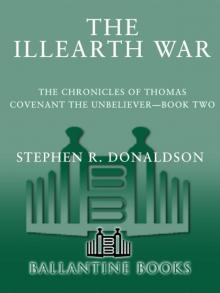 The Illearth War
The Illearth War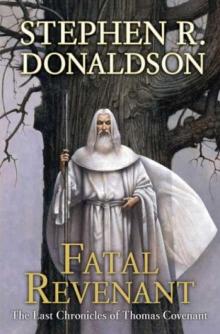 Last Chronicles of Thomas Covenant 02 - Fatal Revenant
Last Chronicles of Thomas Covenant 02 - Fatal Revenant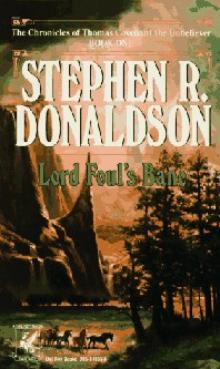 Lord Foul's Bane
Lord Foul's Bane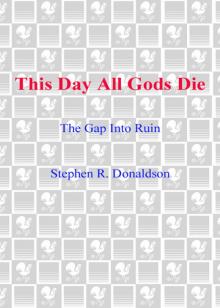 The Gap Into Ruin: This Day All Gods Die
The Gap Into Ruin: This Day All Gods Die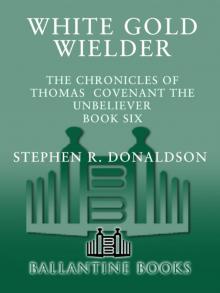 White Gold Wielder
White Gold Wielder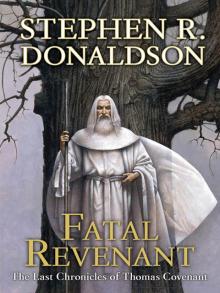 Fatal Revenant
Fatal Revenant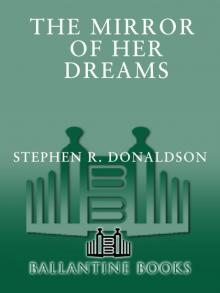 The Mirror of Her Dreams
The Mirror of Her Dreams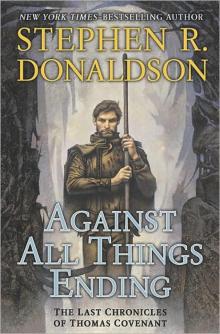 Against All Things Ending
Against All Things Ending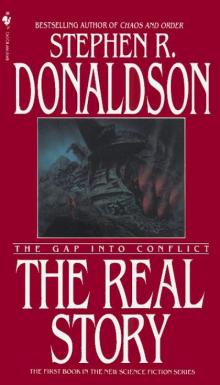 The Real Story: The Gap Into Conflict
The Real Story: The Gap Into Conflict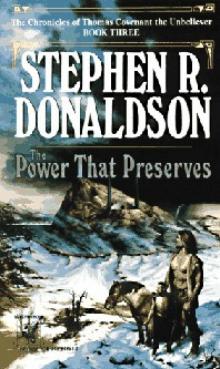 The Power That Preserves
The Power That Preserves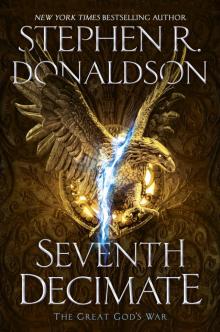 Seventh Decimate
Seventh Decimate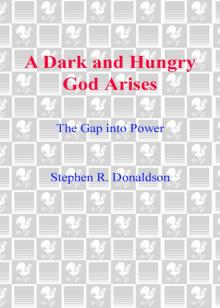 The Gap Into Power: A Dark and Hungry God Arises
The Gap Into Power: A Dark and Hungry God Arises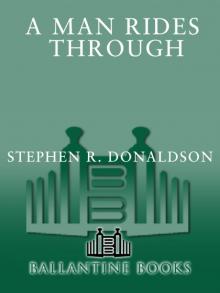 A Man Rides Through
A Man Rides Through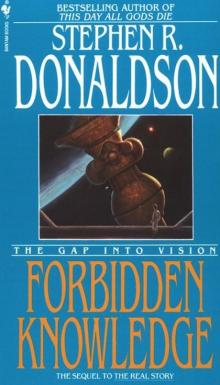 The Gap Into Vision: Forbidden Knowledge
The Gap Into Vision: Forbidden Knowledge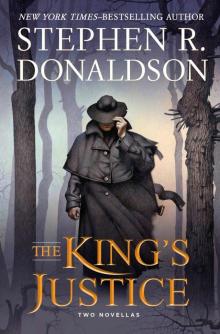 The King's Justice: Two Novellas
The King's Justice: Two Novellas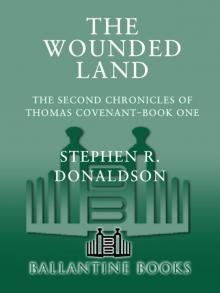 The Wounded Land
The Wounded Land The Runes of the Earth
The Runes of the Earth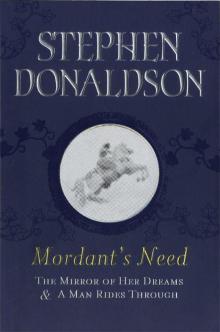 Mordant's Need
Mordant's Need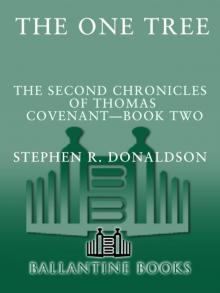 The One Tree
The One Tree Gilden-Fire
Gilden-Fire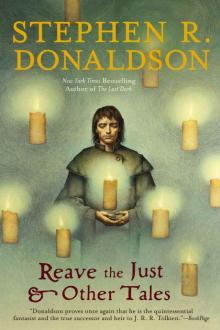 Reave the Just and Other Tales
Reave the Just and Other Tales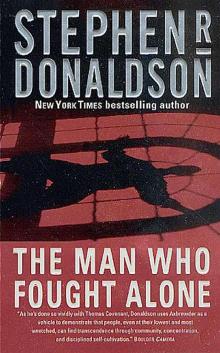 The Man Who Fought Alone
The Man Who Fought Alone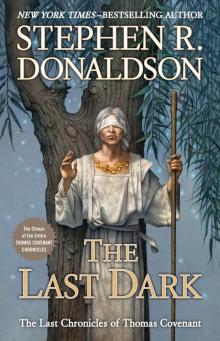 The Last Dark
The Last Dark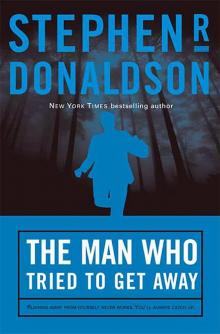 The Man Who Tried to Get Away
The Man Who Tried to Get Away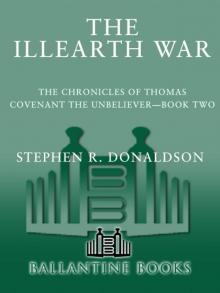 Thomas Covenant 02: The Illearth War
Thomas Covenant 02: The Illearth War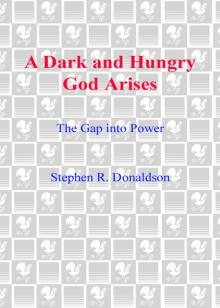 A Dark and Hungry God Arises
A Dark and Hungry God Arises The One Tree t2cotc-2
The One Tree t2cotc-2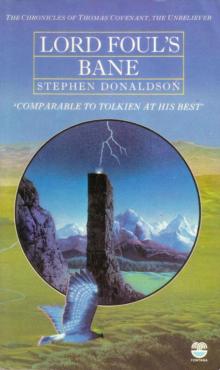 Lord Foul's Bane cotc-1
Lord Foul's Bane cotc-1 The Illearth War t1cotc-2
The Illearth War t1cotc-2 The Runes of the Earth: The Last Chronicles of Thomas Covenant - Book One
The Runes of the Earth: The Last Chronicles of Thomas Covenant - Book One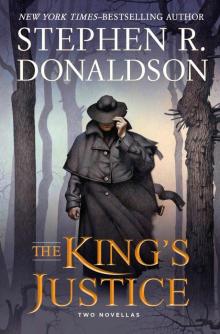 The King's Justice
The King's Justice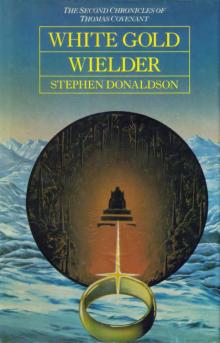 White Gold Wielder t2cotc-3
White Gold Wielder t2cotc-3 The Power That Preserves t1cotc-3
The Power That Preserves t1cotc-3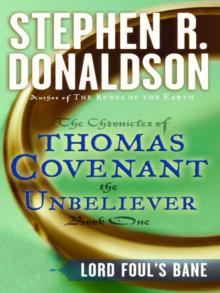 Thomas Covenant 01: Lord Foul's Bane
Thomas Covenant 01: Lord Foul's Bane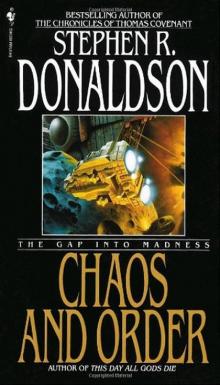 Chaos and Order: The Gap Into Madness
Chaos and Order: The Gap Into Madness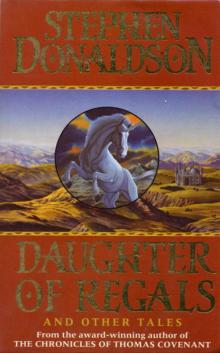 Daughter of Regals
Daughter of Regals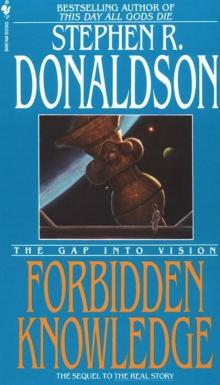 Forbidden Knowledge: The Gap Into Vision
Forbidden Knowledge: The Gap Into Vision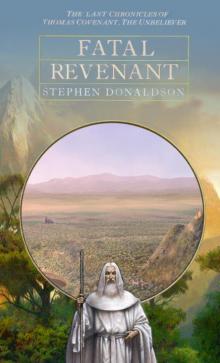 Fatal Revenant t3cotc-2
Fatal Revenant t3cotc-2 The Runes of the Earth t3cotc-1
The Runes of the Earth t3cotc-1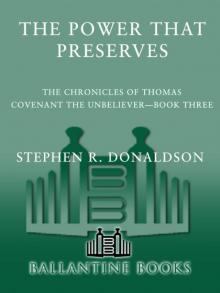 Thomas Covenant 03: Power That Preserves
Thomas Covenant 03: Power That Preserves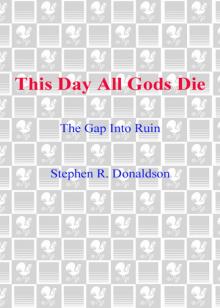 This Day all Gods Die: The Gap into Ruin
This Day all Gods Die: The Gap into Ruin The Wounded Land t2cotc-1
The Wounded Land t2cotc-1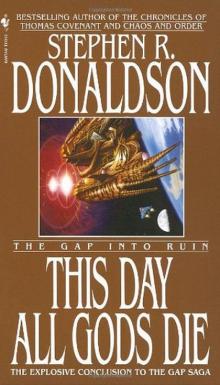 This Day All Gods Die
This Day All Gods Die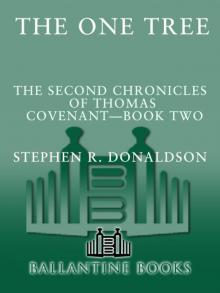 One Tree
One Tree